Child Rights – Child Reporters
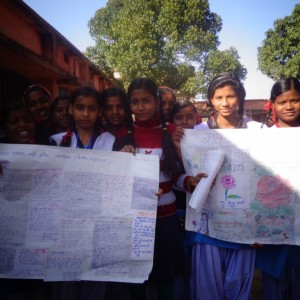
United Nations Child Rights Convention held at Geneva in 1989. In that convention, representatives from 193 countries agreed on four Child Rights
- Rights to Survival
- Right to Development
- Right to Protection
- Right to Participation
It was observed that no children in village schools knew about their rights. Even hardly any teacher knew about the rights of children. Unawareness about right affects the participation of children in development. It is also highly likely that any case of abuse will go unreported if child do not know their rights.
NBJK has been working for past 43 years at the grass root in Bihar and Jharkhand. With the kind support of UNICEF-Jharkhand, NBJK implemented “Child Reporters” Programme. Children in schools are made aware about their rights through workshops and events. They are provided training on writing articles and stories. They are encouraged to write articles on social issues like dowry, poverty, child marriage, environment, development, etc. Best articles are selected and are published in local newspaper. To further improve their confidence, meetings of children are organised with local people representatives/government officials and they exposure to FM radio/studios.
Currently 100 government middle schools are covered in Ranchi district of Jharkhand. Last year, 2585 children have prepared 9947 articles, 4168 poems and 5980 drawings.
This has resulted in overall development of the children. They have become more vocal. With improved writing skills, their academic performance has also increased. Children are aware of their rights and constantly write articles. Their writings have helped in stopping child marriages, reducing dropouts and also they are very active in social issues in their villages.
Remedial Coaching Centres
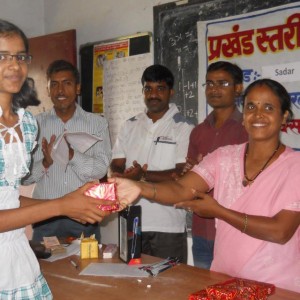
Due to poor teaching at government schools, it has been observed that students reaching class 10th do not know even fundamental of subjects like Maths, Science and English. Naturally they lose interest in subjects and ultimately add the number of either dropout, fail or pass outs with very poor marks in their matriculation.
NBJK has felt the gravity of this problem related to rural school children and decided to support them to furnish their education with quality by opening of Remedial Coaching Centres (RCCs) in Hazaribag district of Jharkhand, with the kind support of Axis Bank Foundation.
There are 100 RCCs providing coaching to more than 4000 students of class 8th, 9th and 10th, in 80 villages of Hazaribag. Regular coaching is provided on Maths, Science and English. Extracurricular activities are also organised for their overall development.
These teachers get orientation & training time to time to upgrade their teaching skill and performed well as RCCs have secured better academic result in comparison with district or state wise average results.
What is the need?
About 85 % population of Jharkhand lives in rural areas. The quality of education at government schools is not up to the mark. Negligence of teachers affects the education of many children of villages in terms of knowledge and academic results. It has been observed that students of class VIII do not even know about simple multiplication, division, etc.
10th is the “Gate-Way” of carrier for any student. If a student does not get good marks in Matric (10th) exams or fails the exam then, it is very difficult for the students to get in to good college for higher studies. This affects their whole life.
People in villages are neither very serious about education nor they are educated that they could help children in home. Private Coaching Classes are situated near town areas and are very costly. Poor children of villages cannot afford for the private coaching, if they want to get better understanding of subjects like Maths, Science and English.
Girl students most affected, as they are not allowed to go to town alone even for the studies and being dropout, they are married very soon.
Our Approach and Achievements
NBJK is one of the most renowned organisations of Jharkhand and Bihar. It has been working for past 43 years at the grassroot level for the development of poor and marginalised section of society.
Feeling the gravity of situation, NBJK with the kind support of Axis Bank Foundation, started 100 Remedial Coaching Centres (RCCs) in Hazaribag district of Jharkhand.
To make RCCs easily accessible by the rural students, these centres are established in the village. Students of Class VIII, IX and X get coaching by experienced faculties on Maths, Science and English. For the overall development students co-curricular activities are organised regularly. To improve the quality of teaching models/projects/TLMs are used.
Faculties of RCCs visit homes of children who are weak in studies. They also visit and counsel the parents of girls about the importance of education and make them aware of effects of early marriage of girls.
Rural students who were earlier either dropout or score very poor marks in Matriculation exams, through RCCs are now scoring better than even the result of town students. Last year, the result of RCCs was 94% while the result of whole Hazaribag district was 70%. About 4500 students each year get benefit of the RCCs.
RCCs have also helped in delaying the early marriage of girls and have checked the dropout rate of students.
Still much to do…
- About 70% of children dropout of schools from Class 1-X. One of the main reason poor teaching at govt. schools resulting in lack of interest in students
- 85% of population lives in villages where there is lack of good coaching centres
- People are so poor that they could not afford for private tuition of children. This affects the result of class X, which is gateway of carrier.
Non-Formal Education
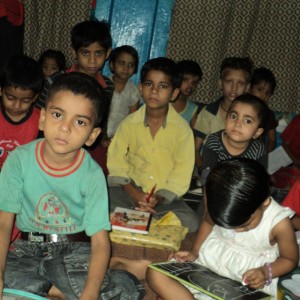
A section of our children and adolescents does not get amicable circumstances to be educated and they miss the very skill of reading or writing to obtain further knowledge as hardship does not permit them to follow formal education system.
NBJK with the kind support of AID offers 5 non-formal education centres for disadvantaged children in slum areas of Patna where they get primary education, health services, life skills and vocational skill training.
These children go for exposure and extra-curricular activities also as play-way method of learning proved helpful for their progress. They are being promoted to enrol in formal schools after getting fundamentals.
180 impoverished children & adolescents are being benefitted by these NFE centres. AID-USA supports the program to take care of such marginalized and unvoiced group of our society.
What is the need?
The situation of muslim and dalit girl children of slums can improve only with education as they are the main sufferers. Most of these children are not allowed to knock the doors of school and are victims of early marriage, domestic and psychological violence and sometimes sexual gratification.
Dalit and Muslim community generally bears a conservative outlook. The girl children are the primary sufferers who are confined within their houses at a tender age of 7-8 and remain at home. They are faced with numerous problems like early marriages which is the root cause of various other problems. They are mostly married at the age of 14 years which has serious implications on her health and wellbeing.
Our Approach and Achievements
NBJK runs 5 Non-Formal Education centres in 5 slums of Patna. Children from age 5-14 years come to these centres where they get primary education, health services, life skills and vocational skill training. Special focus is given to girl children. The NFE teachers visit homes in the slums and convince their parent to send their children to the centre.
The programme earmarked other positive changes in the targeted community by creating awareness on reproductive health, cleanliness and general knowledge. Children attaining competency of Class 3 or 4 are motivated to join government or private schools and continue their education.
Adolescent girls are given training on tailoring, which is running with the support of AID-Columbus chapter. The programme has enhanced holistic development amidst slum dwellers including their children particularly girl child.
Still much to do…
- Dalit and Muslim community generally bears a conservative outlook. The girl children are the primary sufferers and could not study
- These children could rejoin schools once the fundamentals are build and counselling of their parents are done
- Adolescent girls of slums are least educated about reproductive health, hygiene and sanitation
Primary and Secondary education
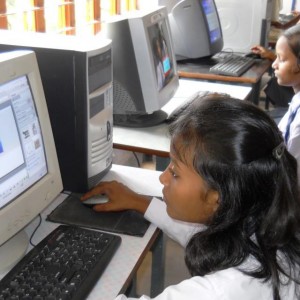
NBJK envisions education as the first step towards development, particularly in the cases of rural children whose parents did not get proper opportunity for schooling.
NBJK runs 5 high schools and 3 primary schools in villages where government schools are distant and even less in number to cover the school going population. These schools are:
- Surekha Prakashbhai Public School
- Amoli Apurva High School
- Chandrakala Devi Daga High School
- Birsa High School
- Roshni Dhruv High School
- Amoli Apurva Primary School (2 units) and
- Komal Pujan Public School
Komal Pujan Public School was initiated in village-Silaunja, Bodhgaya from April, 2016 with 221 children in class Nursery-V. Together, these schools provide quality education to 4, 052 children and enabled 456 students to pass 10th class board examination successfully. Surekha Prakash has shown 100% pass rate with all students with 1st division and followed by Amoli Apurva HS with 98% pass rate.
Amoli Apurva and Chandrakala schools have served the purpose of expanding girls’ education very well in their co-educational setup while Birsa and Roshni Dhruv schools are strategically located in the areas where such high schools were demanded repeatedly by the community. This initiative has checked early child marriage and motivated people to include education as an integral part of their lives. These schools are supported by generous individuals like Prakashbhai, Bhawanibhai, Amoli, Apurva, Roshni, Dhruv, Komal, Pujan and funding agencies namely Give India, Action Village India (AVI), Jamnalal Bajaj Foundation and Jhonson & Jhonson.
What is the need?
Jharkhand is lagging on 35th position in the list of Indian states on Educational Development Index (EDI), 2012-13 released by National University of Education Planning & Administration. The EDI comprises of four parameters: Access, Infrastructure, Teachers and Outcomes. In respect to the development of rural, poor and marginalised communities, Jharkhand is one of the most backward states of India. About 50% of the population lives below the poverty line and 85% of the population lives in rural areas.
The dropout rate for Classes I-V in Jharkhand has increased from 9.4% during 2007-08 to 28.4% in 2010-11 respectively. The dropout rates for Classes I-VIII and Classes I-X in Jharkhand during 2010-11 are 45.1% and 69.5% respectively.
Due to long distance of Secondary Schools from villages and engagement of children in household activities, majority of students drop out of schools after class 5. The figure is alarming for girls, as 45% of girls drop out after class 5.
Our Approach and Achievements
NBJK with the support of generous donors, Prakashbhai, Bhawanibhai, Amoli, Apurva, Roshni, Dhruv, Komal, Pujan and with the support of local villagers, who provided land for some schools, started 5 High Schools and 3 Primary Schools. These schools are:
- Surekha Prakashbhai Public School
- Amoli Apurva High School
- Chandrakala Devi Daga High School
- Birsa High School
- Roshni Dhruv High School
- Amoli Apurva Primary School and
- Komal Pujan Public School
Surekha Prakashbhai, Amoli Apurva and Chandrakala Devi Daga high schools are situated at Chouparan while Birsa and Roshni Dhruv high schools are at Ichak and Churchu blocks of Hazaribag district of Jharkhand State. Though Komal Pujan is a proposed high school at village Silaunja near Bodhgaya but caters primary educational need of the children (Nursery-class V) from villages currently.
Surekha Prakashbhai Public School is equipped with Extramarks Smart Classes to provide these rural children high quality education.
Together, these schools provide quality education to 4, 052 children and 456 students have passed 10th board examination. Surekha Prakash has shown 100% pass rate with all students with 1st division and followed by amoli-Apurva HS with 98% pass rate.
With the support of Give India, Action Village India (AVI) and Jhonson & Jhonson 357 children were sponsored for their education.
Still much to do…
- Droprate of Jharkhand is increasing due to poverty and lack of awareness about importance of education among ST and SC population.
- Most of good schools are located in cities/town with high education fees making admission impossible for the rural children.
- Government secondary schools are located far from villages and quality of education is very poor.
Lord Buddha Home for Children
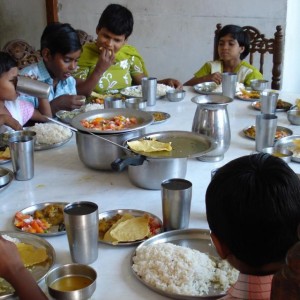
Homeless and destitute children are like any treasure deep in mud without any sign of gold inside them. Their lives mean just to survive and there are plenty of chances for them to be beggars, drug addicts, criminals or any kind of anti-social elements. These children do not deserve this certainly as they need opportunity like other children to prove themselves.
NBJK with the kind support of Stichting Kinderhulp Bodhgaya (SKB) has initiated Lord Buddha Home for Children with a mandate to provide these children homely care, quality education and all support for their growth as responsible citizens.
LBHC is situated in Silounja village near Bodhgaya, the famous pilgrimage town of Bihar. Currently, It accommodates 48 children (21 girls, 27 boys) in 7 houses, cared by one mother for each house. These children are enrolled in good schools affiliated by CBSE, New Delhi. They get remedial tuition and attend computer-music classes as per their interest. LBHC children participate in extracurricular activities in their schools and earned a good name for their institution.
What is the need?
Homeless children are vulnerable to child-labour and exploitation. Their lives mean just to survive. These children, without proper guardianship, get involved in antisocial activities, like begging, criminal activities, drugs, gambling and other bad habits. These children also work as slave in their relative’s house and hotels.
These children are exposed to abuse as they have no social status and no adult to protect them. Without any parental support, these children could not even get the basic necessity of the life like education, health support, nutrition, proper food, sanitation and care. It is estimated that 50,000 children in India leave their home every year due to death of their parent or abuse.
These children do not deserve this certainly as they need opportunity like other children to prove themselves.
Our Approach and Achievements
NBJK initiated a programme for helping these children to live life like a normal family children by establishing Lord Buddha Home for Children (LBHC) in the year 2005, with the kind support of Stichting Kinderhulp Bodhgaya(SKB).
LBHC is spread in an area of 1.75 acres, situated in Silounja village near Bodhgaya, the famous pilgrimage town of Bihar. There are 7 house, with capacity of 10 children in each house, cared by one mother. These children get motherly care, good education in English medium school, life skill training and vocation training, for building there bright future. Children are provided with coaching, music lessons and computer lesson in the camps as per their choices.
We need your kind help.
- To provide these children good education, food and to prepare them for their life, a huge resources is needed every year
- These children who are in class 1-12 needs continuous support to complete their education, until they join a job and start their own independent life
Girl’s Education
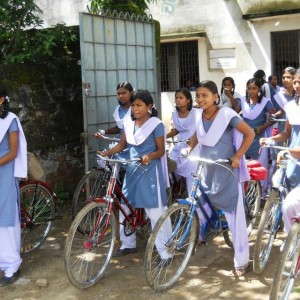
Average 45% of girls drop out of schools in Jharkhand after class 5 due to poverty, social stigma, household works and long distance of schools from villages.
This results in early marriage and many of these girls become mother in adolescence, putting their life in danger.
NBJK try to convince the parent of the girls about the importance of the education and support by providing school fees, books, uniform and other educational needs. In return NBJK takes written bond from their parents not to marry their daughter before she completes her matriculations.
This helped 357 girls to continue their school education last year with support of Action Village India, Give India and Jhonson & Jhonson.
What is the need?
Education is still a distant dream for majority of girl children in villages. If they get school enrolment, there is no certainty for completion of schooling for them.
In Jharkhand 45% of girls drop out of school after primary school (Class 5), in some districts the figure alarmingly goes up to 85%.
Due to Poverty, household works, long distance of schools and stigma of treating girls as Praya-Dhan(others property) many girls are discouraged to take education as a serious business and parents prefer for their marriage in early age of 13-15. Those daughters fail to complete even school education, become mother during adolescence and the same vicious cycle continues for generations.
Our Approach and Achievements
NBJK is one of the most renowned organisations of Bihar and Jharkhand states of India, working for past 43 years at the grassroot level.
A worker meets with the parents of the girl and counsels them towards the importance of Girls Education. NBJK promote girls to complete their schooling and provides tuition fees, books, uniforms and other educational expenses. In return, their parents guarantee by giving a bond on simple paper, against child marriage and ensure for completion of school education till class X without any hurdle posed by family. Thus, ensuring girls education till matriculation and avoiding their early marriage.
Regular follow up, rapport with parents and schools and evaluation of academic achievement are important components of the program. The programme is being implemented in Hazaribag, Gaya, Chatra, Dumka and Ranchi districts of Bihar and Jharkhand by NBJK and 5 network partner VOs also. This helped 357 girls to continue their school education last year with support of Action Village India, Give India and Jhonson & Jhonson. More than 450 girls have completed class X board examination during previous years under the programme.
Still much to do…
- 45-85% of girls drop out of school after class 5
- Jharkhand accounts for highest number of girls trafficking, one of the serious aftereffect of being drop out


